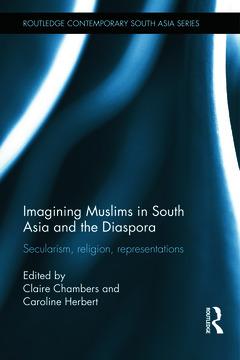Description
Imagining Muslims in South Asia and the Diaspora
Secularism, Religion, Representations
Routledge Contemporary South Asia Series
Coordinators: Chambers Claire, Herbert Caroline
Language: English
Keywords
Anshuman A. Mondal. Aroosa Kanwal. Cara Cilano. Caroline Herbert. E. Rashid. Lindsey Moore. Madeline Clements. Muneeza Shamsie. Peter Morey. Rachel Farebrother. Shamira A. Meghani. Tabish Khair. Young Man. Horned Lark. Spain’s Islamic Past. Prolonged Violent Conflict. Wooden Bridges. Muslim World. Imtiaz Dharker. South Asian Muslims. Tablighi Jamaat. Burnt Shadows. Hizb Ut Tahrir. Muslim Homophobia. Young British Muslim. East London Mosque. Bhutto's Assassination. South Asian Fiction. Bhutto's Death. Black Album. British Muslim Youth. Broken Verses. Queer Muslims. Azad Kashmir. LGBT Identity. South Asian Writers
Publication date: 06-2014
Support: Print on demand
Publication date: 10-2017
· 15.6x23.4 cm · Paperback
Description
/li>Contents
/li>Readership
/li>Biography
/li>
Literary, cinematic and media representations of the disputed category of the ?South Asian Muslim? have undergone substantial change in the last few decades and particularly since the events of September 11, 2001. Here we find the first book-length critical analysis of these representations of Muslims from South Asia and its diaspora in literature, the media, culture and cinema.
Contributors contextualize these depictions against the burgeoning post-9/11 artistic interest in Islam, and also against cultural responses to earlier crises on the subcontinent such as Partition (1947), the 1971 Indo-Pakistan war and secession of Bangladesh, the 1992 Ayodhya riots , the 2002 Gujarat genocide and the Kashmir conflict. Offering a comparative approach, the book explores connections between artists? generic experimentalism and their interpretations of life as Muslims in South Asia and its diaspora, exploring literary and popular fiction, memoir, poetry, news media, and film. The collection highlights the diversity of representations of Muslims and the range of approaches to questions of Muslim religious and cultural identity, as well as secular discourse. Essays by leading scholars in the field highlight the significant role that literature, film, and other cultural products such as music can play in opening up space for complex reflections on Muslim identities and cultures, and how such imaginative cultural forms can enable us to rethink secularism and religion.
Surveying a broad range of up-to-date writing and cultural production, this concise and pioneering critical analysis of representations of South Asian Muslims will be of interest to students and academics of a variety of subjects including Asian Studies, Literary Studies, Media Studies, Women?s Studies, Contemporary Politics, Migration History, Film studies, and Cultural Studies.
Introduction: Contexts and Text Part I: Surveying the Field; Comparative Approaches 1. The Making of a Muslim 2. Representations of Young Muslims in Contemporary British South Asian Fiction. 3. Before and Beyond the Nation: South Asian and Maghrebi Muslim Women’s Fiction Part II: Syncretism, Muslim Cosmopolitanism, and Secularism 4. Restoring the Narration: South Asian English writing and Al-Andalus 5. Music, Secularism and South Asian Fiction: Muslim Culture and Minority Identities in Shashi Deshpande’s Small Remedies 6. ‘A Shrine of Words’: The Politics and Poetics of Space in Agha Shahid Ali’s The Country Without a Post Office 7. Hamlet in Paradise: The Politics of Procrastination in Mirza Waheed’s The CollaboratorPart III: Currents within South Asian Islam 8. Liberalizing Islam through the Bildungsroman: Ed Husain’s The Islamist 9. Enchanted Realms, Sceptical Perspectives: Salman Rushdie’s Recent Fiction 10. Tahmima Anam’s The Good Muslim: Bangladeshi Islam, Secularism and the Tablighi Jamaat Part IV: Representations, Stereotypes, Islamophobia11. Saving Pakistan from Brown Men: Benazir Bhutto as Pakistan’s Last Best Hope for Democracy 12. Queer South Asian Muslims: The Ethnic Closet and its Secular Limits 13. After 9/11: Islamophobia in Kamila Shamsie’s Broken Verses and Burnt Shadows
Claire Chambers is Lecturer in Global Literature at the University of York, UK. She researches modern literature from South Asia, the Arab world and their diasporas. Claire is the author of British Muslim Fictions: Interviews with Contemporary Writers and the forthcoming Representations of Muslims in Britain.
Caroline Herbert is Senior Lecturer in Postcolonial Literatures at Leeds Metropolitan University, UK. Her research centres on contemporary South Asian Literature and film, with a specific interest in narratives of urban modernity, secularism, and economic liberalization in India. She is editor of Postcolonial Cities: South Asia, a special issue of Moving Worlds (2013).



